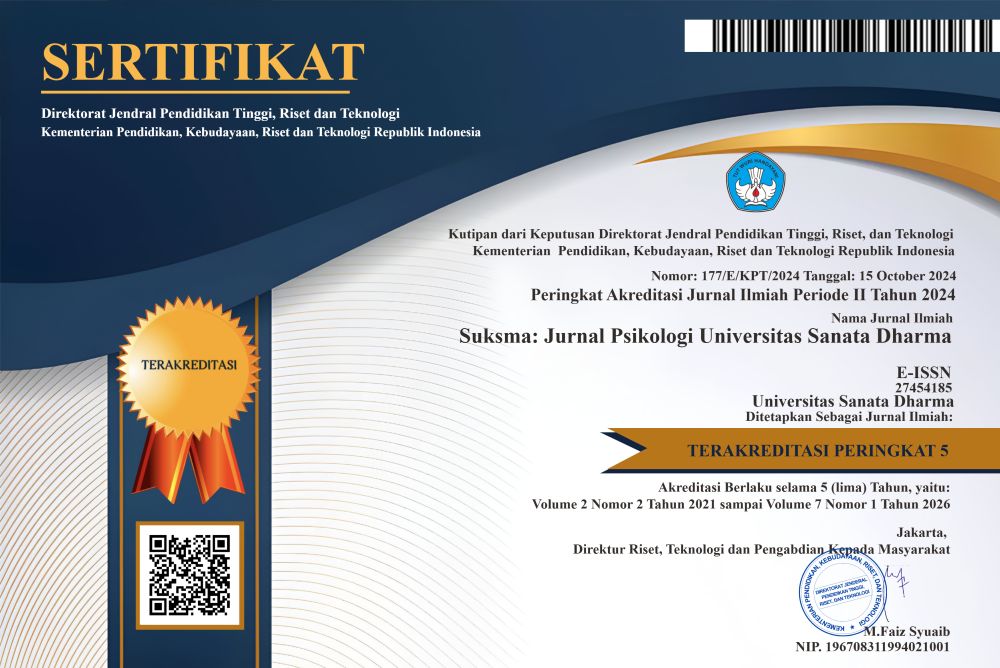Pengaruh Komitmen Afektif terhadap Organizational Citizenship Behavior (OCB) pada Karyawan di Samarinda
(1) Universitas Muhammadiyah Kalimantan Timur
(2) Universitas Muhammadiyah Kalimantan Timur
(*) Corresponding Author
Abstract
Keywords
Full Text:
PDFReferences
Al-Haroon, H. I., & Al-Qahtani, M. F. (2020). Assessment of organisational commitment among nurses in a major public hospital in Saudi Arabia. Multidisciplinary Healthcare, 13, 519–526. https://doi.org/10.2147/JMDH.S256856 Alqudah, I. H. A., Carballo-Penela, A., & Ruzo-Sanmartín, E. (2022). High performance human resource management practices and readiness for change: an integrative model including affective commitment, employees’ performance, and the moderating role of hierarchy culture. European Research on Management and Business Economics, 28(1), 100177. https://doi.org/10.1016/j.iedeen.2021.100177. Anitra, V., & Astuti, T. (2019). The relationship of the effectiveness of interpersonal communication, working age and job tenure with organizational commitment. Jurnal Ekonomi dan Manajemen, 14(1), 158-169. Astuti, T., & Helmi, A. F. (2020). Perceived supervisor support and turnover intention: A meta-analysis study. Buletin Psikologi, 29(1), 1-13. DOI: 10.22146/buletinpsikologi.54366 Astuti, T., & Helmi, A. F. (2023). Differences in organizational behavior amongst startup and established company: A literature Review. Buletin Psikologi, 31(2), 173-191. DOI: 10.22146/buletinpsikologi.82949 Astuti, T., Helmi, A. F., Bil Haq, A. H., Al Farauqi, M. D. A. (2020). The dynamic of performing social relations amongst managers and supervisors: A thematic analysis. The Qualitative Report, 25(3), 700-720. https://nsuworks.nova.edu/tqr/vol25/iss3/10 Benjamin, A. (2012). The influence of affective commitment on citizenship behavior and intention to quit among commercial banks' employees in Nigeria. Journal of Management and Sustainability. Bhatti, M. H., Ju, Y., Akram, U., Bhatti, M. H., Akram, Z., & Bilal, M. (2019). Impact of participative leadership on organizational citizenship behavior: mediating role of trust and moderating role of continuance commitment: Evidence from the Pakistan hotel industry. Sustainability, 11(4). https://doi.org/10.3390/su11041170 Boger, R. S. (2005). Organizational citizenship behavior in school: How does it relate to participation in decision making? Journal of Educational Administration, 43(5), 420-438. https://doi.org/10.1108/09578230510621322 Carmeli, A., & Nihal Colakoglu, S. (2005). The relationship between affective commitment and organizational citizenship behaviors: The moderating role of emotional intelligence, Ashkanasy, N.M., Zerbe, W.J. and Härtel, C.E.J. (Ed.) The Effect of Affect in Organizational Settings (Research on Emotion in Organizations. Emerald Group Publishing Limited, Leeds, 77-93. https://doi.org/10.1016/S1746-9791(05)01104-1 Felicia. (2017). Pengaruh komitmen organisasional terhadap organizational citizenship behavior di Hotel Gunawangsa Mayar Surabaya. Publication Petra, 5(2). Jufrizen, J, Khair, H., & Sari, A. P. (2023). Work engagement: Determinants and its effect on organisational citizenship behavior. Jurnal Manajemen, 27(2), 254–275. https://doi.org/10.24912/jm.v27i2.1130. Kartika, A. (2011). Komitmen organisasi: Nilai-nilai, tujuan, dan keanggotaan. Jurnal Manajemen, 15(2), 45-60. Kelana. (2009). Pengaruh kepuasan kerja dan komitmen organisasi terhadap organizational citizenship behaviour (OCB). Sinergi, 11(1), 59-75. https://doi.org/10.22441/sinergi.2009.1.009 L ́opez-Cabarcos, M. ́Angeles, Vázquez-Rodríguez, P., & Quiñoá-Piñeiro, L. M. (2022). An approach to employees’ job performance through work environmental variables and leadership behaviours. Journal of Business Research, 140, 361–369. https://doi.org/10.1016/j.jbusres.2021.11.006. Malik, S. Z., Saleem, M., & Naeem, R. (2016). Effect of leadership styles on organizational citizenship behaviour in employees of telecom sector in Pakistan. Pakistan Economic and Social Review, 54(2), 385-406. Meyer, J. P., & Allen, N. J. (1991). A three-component conceptualization of organizational commitment. Human Resource Management Review, 1(1), 61-89. Montgomery, D. C., Peck, E. A., & Vining, G. G. (2012). Introduction to Linear Regression Analysis. Wiley. Naway, F. A. (2018). Organizational citizenship behavior dalam kinerja organisasi. Yogyakarta: Zahir Publishing. ISBN: 978-602-5541-40-7 Organ, D. W. (2006). Organizational Citizenship Behavior: Its Nature, Antecedents and Consequences. California: SAGE Publications, Inc. https://doi.org/10.4135/9781452231082 Pangestuti, D. C. (2018). Pengaruh dukungan organisasi, kepuasan kerja, dan komitmen afektif terhadap organizational citizenship behavior. Jurnal Mitra Manajemen JMM Online, 2(4), 366-381. https://doi.org/10.31227/osf.io/abc12 Podsakoff, N. P., & MacKenzie, S. B. (2014). Consequences of unit-level organizational citizenship behaviors: A review and recommendations for future research. Journal of Organizational Behavior, 35(1), S87–S119. https://doi.org/10.1002/job.1911 Putri, U. (2017). Pengaruh organizational citizenship behavior (OCB) terhadap kinerja (studi pada perawat ruang rawat inap Rumah Sakit Baptis Batu). Jurnal Administrasi Bisnis, 46(1), 25-30. Ragel, S., & Ragel, V. R. (2017). The effects of job rotation, role stress and job satisfaction on organizational citizenship behavior of bank employees. Asian Journal of Economics, Business and Accounting 4, 1-10. Rahman, M. H. A., & Karim, D. N. (2022). Organizational justice and organizational citizenship behavior: The mediating role of work engagement. Heliyon, 8(5), 1–13. https://doi.org/10.1016/j.heliyon.2022.e09450. Robbins, S. P. (2013). Organizational Behavior (15th ed.). Pearson Education. Riyanto, R., & Hatmawan, H. (2020). Rumus Lemeshow dan aplikasi ukuran sampel. Jurnal Metodologi Penelitian, 10(2), 120-130. Shahin, A., Naftchali, J. S., & Pool, J. K. (2014). Developing a model for the influence of perceived organizational climate on organizational citizenship behaviour and organizational performance based on balanced score card. International Journal of Productivity and Performance Management, 63(3) , 290-307. Snyder, J. L. & Cistulli, M. D., (2011). The relationship between workplace e-mail privacy and psychological contract violation, and their influence on trust in top management and affective commitment. Communication Research Reports, 28(2),121-129 Sugiyono. (2017). Metodologi penelitian kuantitatif, kualitatif dan R&D. ALFABETA. Sugiyono. (2019). Metodologi penelitian kuantitatif, kualitatif dan R&D. ALFABETA. Theodora, T. H., & Ratnaningsih, I. Z. (2018). Hubungan antara psychological capital dengan organizational citizenship behavior pada pramuniaga pt x cabang Tangerang. Jurnal Empati, 7(2), 285–293 Veličkovska, I. (2017). Organizational citizenship behavior-definition, determinants and effects. Engineering management 3(1) , 40-51.
DOI: https://doi.org/10.24071/suksma.v5i3.9348
Refbacks
- There are currently no refbacks.


